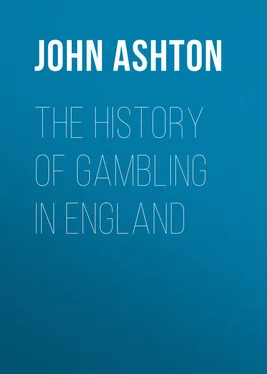John Ashton - The History of Gambling in England
Здесь есть возможность читать онлайн «John Ashton - The History of Gambling in England» — ознакомительный отрывок электронной книги совершенно бесплатно, а после прочтения отрывка купить полную версию. В некоторых случаях можно слушать аудио, скачать через торрент в формате fb2 и присутствует краткое содержание. Жанр: foreign_antique, foreign_prose, на английском языке. Описание произведения, (предисловие) а так же отзывы посетителей доступны на портале библиотеки ЛибКат.
- Название:The History of Gambling in England
- Автор:
- Жанр:
- Год:неизвестен
- ISBN:нет данных
- Рейтинг книги:5 / 5. Голосов: 1
-
Избранное:Добавить в избранное
- Отзывы:
-
Ваша оценка:
- 100
- 1
- 2
- 3
- 4
- 5
The History of Gambling in England: краткое содержание, описание и аннотация
Предлагаем к чтению аннотацию, описание, краткое содержание или предисловие (зависит от того, что написал сам автор книги «The History of Gambling in England»). Если вы не нашли необходимую информацию о книге — напишите в комментариях, мы постараемся отыскать её.
The History of Gambling in England — читать онлайн ознакомительный отрывок
Ниже представлен текст книги, разбитый по страницам. Система сохранения места последней прочитанной страницы, позволяет с удобством читать онлайн бесплатно книгу «The History of Gambling in England», без необходимости каждый раз заново искать на чём Вы остановились. Поставьте закладку, и сможете в любой момент перейти на страницу, на которой закончили чтение.
Интервал:
Закладка:
Bourchier became very rich by gambling, and purchased an estate near Pershore in Worcestershire, where he was buried – but he died in London in 1702, aged 45.
Lucas tells a story about gamblers, which, although it has no reference to England, is too good to leave out.
“But, for a farther unquestionable Testimony of the Mischiefs that often arise from Gaming, this is a very remarkable, but dreadful Passage, which I am now going to recite. Near Bellizona , in Switzerland , Three Men were playing at Dice on the Sabbath Day ; and one of ‘em, call’d Ulrick Schrœteus , having lost his Money, and, at last, expecting a good Cast, broke out into a most blasphemous Speech, threatening, That, if Fortune deceiv’d him then, he would thrust his Dagger into the very body of God, as far as he could . The cast miscarrying, the Villain drew his Dagger, and threw it against Heaven with all his Strength; when, behold, the Dagger vanish’d, and several Drops of Blood fell upon the table in the midst of them: and the Devil immediately came and carry’d away the blasphemous Wretch, with such a Noise and Stink, that the whole City was amaz’d at it. The others, half distracted with Fear, strove to wipe out the Drops of Blood that were upon the Table, but the more they rubb’d ‘em, the more plainly they appear’d. The Rumour hereof flying to the City, multitudes of People flock’d to the Place, where they found the Gamesters washing the Board; whom they bound in Chains, and carried towards the Prison; but, as they were upon the way, one of ‘em was suddenly struck dead, with such a Number of Lice crawling out of him, as was wonderful and loathsome to behold: And the Third was immediately put to Death by the Citizens, to avert the Divine Indignation and Vengence, which seem’d to hang over their heads. The Table was preserv’d in the Place, and kept as a Monument of the Judgments of God on Blasphemers and Sabbath-breakers; and to show the mischiefs and inconveniences that often attend Gaming.”
Loaded Dice continued to be used – for on 18th April 1740 were committed to Newgate, on the oaths of seven gentlemen of distinction, Thomas Lyell, Lawrence Sydney, and John Roberts, for cheating and defrauding with false and loaded dice, those particular gentlemen, at the Masquerade, to the value of about £400, and other gentlemen not present at the examination of about £4000 more; and out of about nine pairs of dice which were cut asunder, only one single dice was found unloaded. For this, Lyell and Sidney stood in the Pillory, near the Opera House, on 2nd June 1742, two years after the offence was committed.
And two days afterwards, a cause was tried in the Court of King’s Bench, on an indictment against a gentleman for winning the sum of £500 at hazard about seven years before; and, after a long trial, the jury found him guilty, the penalty being £2500.
To show the prevalence of dicing, it may be mentioned that when the floors of the Middle Temple Hall were taken up somewhere about 1764, among other things were found nearly one hundred pairs of dice which had fallen through the chinks of the flooring. They were about one-third smaller than those now in use. And Malcolm 12 12 Anecdotes of the “Manners and Customs of London during the 18th Century,” by J. P. Malcolm. Lon. 1808. 4to.
says: “However unpleasant the yells of barrow women with their commodities are at present, no other mischief arises from them than the obstruction of the ways. It was far otherwise before 1716 when they generally carried Dice with them, and children were enticed to throw for fruit and nuts, or, indeed, any persons of a more advanced age. However, in the year just mentioned, the Lord Mayor issued an order to apprehend all retailers so offending, which speedily put an end to street gaming; though I am sorry to observe that some miscreants now (1808) carry little wheels marked with numbers, which, being turned, govern the chance by the figure a hand in the centre points to when stopped.” When I was young the itinerent vendors of sweets had a “dolly,” which was a rude representation of a man, hollowed spirally; a marble was dropped in at its head, and coming out at its toes, spun round a board until it finally subsided into one of the numerous numbered hollows it contained. When that was made illegal, a numbered teetotum was used, and now childhood is beguiled with the promise of a threepenny piece, or other prize, to be found in packets of sweets.
CHAPTER I
Latimer and Cards – Discourse between a Preacher and a Professor – The Perpetual Almanack, or Soldier’s Prayer Book – Origin of Playing Cards – Earliest Notice – Royal Card Playing.
Before going into the history, &c., of playing cards, it may be as well to note the serious application that was made of them by some persons: and first, we will glance at the two sermons of Latimer’s on cards, which he delivered in St Edward’s Church, Cambridge, on the Sunday before Christmas Day 1529. In these sermons he used the card playing of the season for illustrations of spiritual truth. By having recourse to a series of similes, drawn from the rules of Primero and Trump, he illustrated his subject in a manner that for some weeks after caused his pithy sentences to be recalled at well nigh every social gathering; and his Card Sermons became the talk both of Town and University. The novelty of his method of treatment made it a complete success; and it was felt throughout the University that his shafts had told with more than ordinary effect. But, of course, these sermons being preached in pre-Reformation days, were considered somewhat heretical, and Buckenham, the Prior of the Dominicans at Cambridge, tried to answer Latimer in the same view. As Latimer derived his illustrations from Cards, so did Buckenham from Dice, and he instructed his hearers how they might confound Lutheranism by throwing quatre and cinque: the quatre being the “four doctors” of the Church, and the cinque being five passages from the New Testament selected by the preacher.
Says Latimer in the first of these sermons: “Now then, what is Christ’s rule? Christ’s rule consisteth in many things, as in the Commandments, and the Works of Mercy and so forth. And for because I cannot declare Christ’s rule unto you at one time, as it ought to be done, I will apply myself according to your custom at this time of Christmas. I will, as I said, declare unto you Christ’s rule, but that shall be in Christ’s Cards. And, whereas you are wont to celebrate Christmas by playing at Cards, I intend, by God’s grace to deal unto you Christ’s Cards, wherein you shall perceive Christ’s rule. The game that we will play at shall be called The Triumph, which, if it be well played at, he that dealeth shall win; the players shall likewise win; and the standers and lookers on shall do the same; insomuch that no man that is willing to play at this Triumph with these Cards, but they shall be all winners, and no losers.”
Next, is a curious little Black Letter tract, by James Balmford published in 1593. 13 13 A Short and Plaine Dialogue concerning the unlawfulnes of playing at Cards, or Tables, or any other Game consisting in Chance.
It is a dialogue between a Professor and a Preacher.
“ Professor. Sir, howsoever I am perswaded by that which I reade in the common places of Peter Martyr, par. 2, pag. 525, b. that Dice condemned both by the Civill lawes (and by the Fathers), are therefore unlawfull, because they depend upon chance; yet not satisfied with that which he writeth of Table playing, pag. 516, b. I would crave your opinion concerning playing at Tables and Cards.
Preacher. Saving the judgement of so excellent a Divine, so Farre as I can learne out of God’s word, Cardes and Tables seeme to mee no more lawfull, (though less offensive) than Dice. For Table playing is no whit the more lawfull, because Plato compares the life of man thereunto, than a theefe is the more justifiable, because Christ compareth his second coming to burglarie in the night (Mat. xxiv. 43, 44). Againe, if Dice be wholly evill, because they wholly depend upon chance, then Tables and Cardes must needes be somewhat evill, because they somewhat depend upon chance. Therefore, consider well this reason, which condemneth the one as well as the other: Lots are not to be used in sport; but games consisting in chance, as Dice, Cardes, Tables, are Lots; therefore not to be used in sport.
Читать дальшеИнтервал:
Закладка:
Похожие книги на «The History of Gambling in England»
Представляем Вашему вниманию похожие книги на «The History of Gambling in England» списком для выбора. Мы отобрали схожую по названию и смыслу литературу в надежде предоставить читателям больше вариантов отыскать новые, интересные, ещё непрочитанные произведения.
Обсуждение, отзывы о книге «The History of Gambling in England» и просто собственные мнения читателей. Оставьте ваши комментарии, напишите, что Вы думаете о произведении, его смысле или главных героях. Укажите что конкретно понравилось, а что нет, и почему Вы так считаете.












